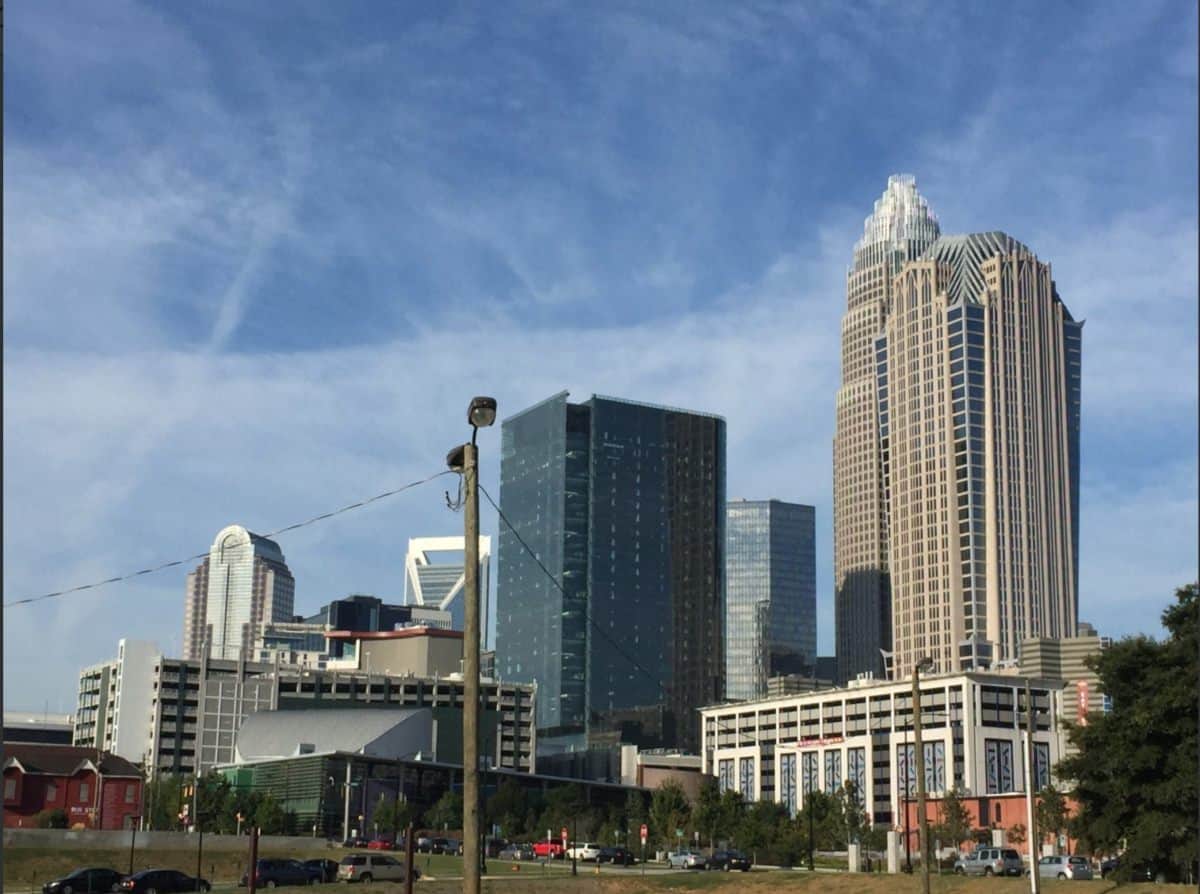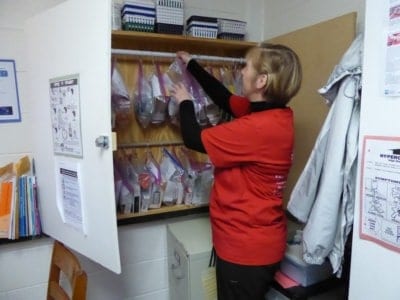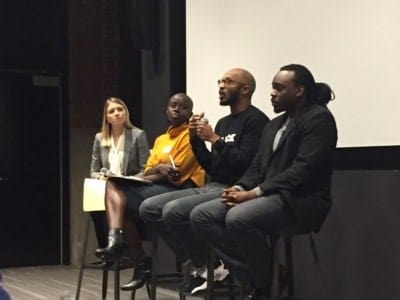When you Google the school where I teach, you’ll be met with negative headlines that make you wonder what exactly happens inside the confines of West Mecklenburg High School – the home of the Hawks and one of the oldest schools within CMS.
Is an Internet search truly indicative of the school environment where I have spent 11 years of my career educating high school students and trying to lead them to success? I beg to negate what is perpetrated in the media and on the Internet by presenting the other tale of West Mecklenburg High School – the tale that doesn’t seem to get shared nearly enough.
Founded in 1951, West Mecklenburg High School was built to support the needs of the surrounding Charlotte area at the time. The majority of the area was farmland, and “the Meck schools” – North Meck, South Meck, East Meck, and West Meck – were all built to accommodate those students who lived on the outskirts of the city. Over the years, as the Charlotte landscape changed, so did the schools’ demographics. Today, over 90 percent of the students at West Mecklenburg are minorities, receiving free or reduced lunch. A large number of our students are from places other than Charlotte, having moved to this area with families who relocated for work, new opportunities, and/or refuge. Needless to say, a school with a population that has ranged from roughly 2,300 students in 2006 to 1,600 students in 2017 has had its share of incidents.
Unfortunately, historical changes are not what welcomes visitors to our school. Those who interview for positions at West Meck Google our school looking for information, and what they find often leaves them full of hesitation about joining our school community. Even our current principal, Casey Jones, was welcomed to the area with word of West Meck’s problems. When asked what he learned about West Meck once he arrived to the area, he recounted, “I learned about Charlotte, how it’s a victim of its history. We were predominantly a Caucasian school until the ’80s. Charlotte got bigger and the minority demographic got bigger, but the [nearby] property owners didn’t change, and so they look at the faces of this campus differently.”
What doesn’t always get told about our school is that WMHS houses 120 courageous and hard-working educators and 1,600 talented and intelligent young scholars. We are proud to be the producers of award-winning athletes and sports teams, students who showcase their artistic and musical talents in annual concerts, student and staff community volunteers, and graduates who attend universities with full scholarships.
Why is it that these positive attributes about our school are not front-page news? Even when offered personal invitations, the media fails to report the positives. Last year, an anonymous letter hit the news stating that employees were operating under a culture of fear. Immediately, a news reporter set up across the street from the school to get the story.
“It was a personal attack without any facts,” Principal Jones says, “so I decided to bring the reporter in and shared the letter with those who represented the composition of our staff and had them give feedback.”
After the chat with staff, a student invited that same news reporter to attend that night’s senior award ceremony where many seniors were awarded college scholarships. It was a prime opportunity to highlight some positive to accompany the negative. The news reporter failed to attend.
In 2015, a group of like-minded students and teachers created Uplift West Meck, led by current Multi-Classroom Leader Kristen Karazsia, with the mission to change the perception of the school and battle the news channels that were scrutinizing us daily for minor occurrences that happen everywhere. As Ms. Karazsia puts it, “The community was picking up on the chatter. Students would spend their days on campus growing, learning, and readying themselves for a bright future, but they’d go home to hear they were fighting, disrespecting, and regressing.”
The group decorated the halls and bathrooms with uplifting, positive messages, and they volunteered to help teachers during their planning periods. “Then, we took it to the streets. We sponsored a community march titled, ‘Stomp Out the Stereotypes,’ which finally allowed us to receive some positive attention from the media. Shortly after, we hosted a community cookout that earned a large amount of money for the school. We ended the school year feeling accomplished and invigorated, ready to take on the media and its negative coverage.”
While Uplift West Meck is no longer an active group, Ms. Karazsia has recently begun feeling the need to restart the effort. Meanwhile, other initiatives have formed with the same purpose, and some of the school’s community partnerships, especially those with faith-based organizations, have been sustained. Mount Carmel Baptist Church, Harvest Church, and Elevation Church help us with the use of their facilities, teacher appreciation events, and campus clean-up efforts.
Our school still struggles to gain partnerships with local businesses in the West Charlotte area despite the numerous efforts to establish those connections. I speculate that the negative reputation painted by the media has caused many of those businesses to shy away from welcoming and sponsoring their neighborhood school.
Now, I know what many readers are thinking because I have thought it myself more times than I’d like to admit: the negative incidents did occur, and community members are probably growing weary of the overwhelming number of unfavorable news stories as well. Just recently, our school was in the news for having a number of fights on campus that resulted in several arrests and even more suspensions.
Even some of the veteran educators at West Meck were shocked by these events because our school’s educators have been working in overdrive to combat the occurrences of violence. The day after The Charlotte Observer reported that “7 students were arrested,” West Mecklenburg High was one of 12 CMS schools that were honored by the North Carolina Department of Public Instruction for our use of Positive Behavior Intervention and Support (PBIS), receiving the “Blue Ribbon” award after increasing implementation of the program from Year 1 to 2. Newly appointed Assistant Principal Darrell Potts is a strong advocate of the program.
“PBIS has been an integral part of our school’s cultural transformation. Through the implementation of this program, we have been able to teach and model the behaviors expected of our students on a daily basis.”
Because of the defeatist attention on the multiple fights at West Meck, many of those who worked tirelessly to help achieve this award did not even realize we had done so. Even in light of proof that our school is improving, few seem to see the actions that the school is taking to create a more positive school culture. We are still being looked at as a school who just allows violent incidents to occur.
West Meck is not the only school with negative incidents to report, but we have an overwhelmingly high number of negative news stories published compared to other schools whose number of incidents are the same or greater. When asked what frustrates him the most about the media coverage of West Meck, Principal Jones stated, “The everyday media coverage is a level of racism.” He personally thinks the media strategically targets those schools in urban districts that have a large number of minority students, portraying those schools as dangerous environments when they are not.
“When it comes to violent incidents, we are in the middle of the pack for schools [in CMS] that look like ours and schools that don’t look like ours. When things are good, we get omitted. When things are challenging, we are the focus. Even when they are talking about other schools, they include West Meck even if we have a good week. We are in the news regardless. A lot of the coverage is not real journalism. It’s sensationalism.”
I challenge local media outlets to reflect upon their practices and their need to use the negative choices of a few as a platform for maintaining ratings and gaining likes. Some of those negligent practices influence readers without them even knowing it. For instance, with some investigating, I learned that there have been times when media outlets reported that they reached out to the school, and the school declined to comment. In reality, those media outlets sent emails to the CMS Communications department, but presented as though school personnel have something to hide.
The lack of accurate wording is enough to cause doubt in the public eye. Media outlets must make the choice to stand as pillars in the communities they serve. Students and educators work tirelessly inside the walls of an institution whose reputation gets marred every time the media makes the choice to give negativity the spotlight and not counter it with any positivity. Principal Jones would agree: “People will try to live up to what [the media] portrays in the news, reinforcing a stereotype. It’s a self-fulfilling prophecy. If you throw it out there, people will believe it to be true and they will live up to those expectations.”
I also challenge those community members who actively stand in the way of progress and growth by seeking out opportunities to draw negative attention to our neighborhood high school. Be mindful of the words you speak. Sometimes the gossip you spread does more harm than good, especially when it affects the lives of children.
Shalana Lackey, the compliance facilitator for Exceptional Children, works with some of the students who need the most support, and she has a strong message for the community: “I think the community needs to carefully think about the negative comments or feedback that they give when speaking to the news. Nothing bothers me more than to see/hear a parent talk down about West Meck, neglecting to understand that the students we have are the students they send. We teach and serve what the community sends us. We deal with everything they bring in the building. I would also challenge the community to question the motives of the media and challenge them to report all the news.”
Finally, I have a challenge for the educators of schools like West Mecklenburg High School. It is time for you to take ownership of the narrative and be sure the tale told about your school is a balanced one. Your voices – whether it be in newspapers, in person, or on social media – are powerful.
West Meck is in a constant tug of war to get traction with some of our most needy students, engage parents in the process, build trust between the school and community, and establish productive relationships on our campus. We cannot do it alone. Everyone on our campus and in our community, including the media, plays a role in helping us achieve greatness.
Editor’s Note: This article was originally published in The Charlotte Post. It has been republished with the author’s permission.





